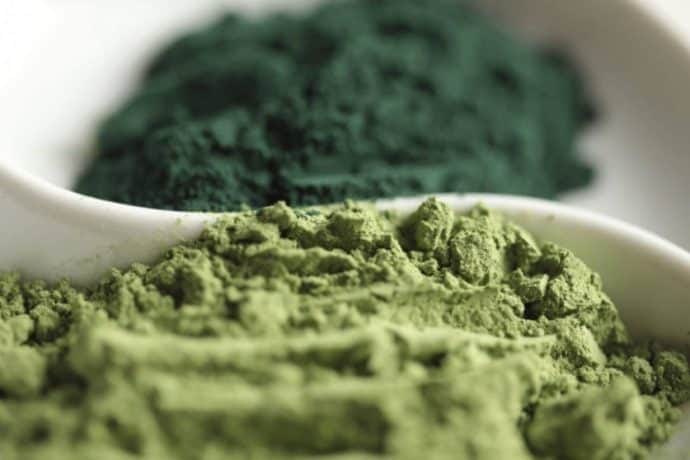Algae Superfoods- The Health Benefits of Taking Spirulina and Chlorella Together
If you’ve been immersed into the healthy food world, you may have heard of these two “superfoods” called Spirulina and Chlorella, but what exactly are they, and are there any differences between the two?
Both are types of micro-algae found in bodies of water, and both have powerful nutrients to help boost your immune health and aid in healing other ailments of the body. I’ll discuss each one separately, and then talk about the differences between the two and the health benefits of each.
What Is Spirulina?
Spirulina has been touted as a “superfood,” and there’s plenty of reason to back up that claim. This bright blue-green powder isn’t a herb, but actually a type of algae, and one of the oldest life forms on earth. It’s also incredibly nutrient rich and full of protein, antioxidants, amino-acids, vitamin B-12, iron, minerals, and chlorophyll.
Spirulina comes from warm natural fresh-water lakes, ponds, streams, and saltwater, but can also be harvested from man-made reservoirs. When properly grown and harvested, it is one of the most nutrient-dense foods in the world. It’s been used as a nutrient-rich food source for centuries among the Aztecs and other Mesoamericans.
Benefits of Taking Spirulina:
-
Is a complete protein containing all the amino acids for the body including an essential Omega-6 fatty acid called gamma-Linolenic, or (GLA).
-
Since GLA doesn’t often occur in most food sources, the body has to naturally produce it, but Spirulina is one of the few foods that contains a natural supply of GLA.
-
Rich in Omega-3, 6, and 9’s.
-
High level of Chlorophyll, an incredible antioxidant that helps detoxify the body and boost immune system health.
-
Dried Spirulina is very high in calcium at 120mg per 100 grams.
-
A great source of iron at 28.5mg per 100 grams, which is wonderful for anyone with anemia, or any other type of iron deficiency.
-
Spirulina is high in phosphorus, essential in helping to remineralize teeth.
-
Excellent source of Vitamin K, an essential fat-soluble vitamin the body needs for blood coagulation, and for binding calcium ions for healthy teeth and bones.
-
Spirulina can even help increase fat burning during exercise.
(Check with your doctor before taking, or stopping Spirulina, if you’re on any type of anti-coagulation medication).
What Is Chlorella?
Chlorella is very similar to Spirulina in that it’s a micro-algae, but it hasn’t been around as long and has a bright green color. Like Spirulina, Chlorella is also found in fresh bodies of water, but can be difficult to harvest due to its microscopic size and tendency to grow alongside other organisms.
Chlorella has been cultivated as a potential food source because of its high amount of protein, fat, and carbohydrates. During the 1940’s, it was seen as a potential solution to the ever-growing fears to the then-current food crisis that was occurring. Now it is being used for all types of health benefits and healing.
Benefits of Taking Chlorella:
Since Chlorella is extremely similar to Spirulina, most of the benefits are going to be the same with only a few slight differences.
-
A great potential food source with around 45% protein, 20% fat, 20% carbohydrate, 5% fiber, plus vitamins and minerals.
-
Chlorella helps bind and remove heavy metals from the body.
-
High in Chlorophyll, which enables the body to detox and flush out any harmful toxins and chemicals.
-
Rich in Nucleic Acids, key factors in DNA and RNA that help protect cells.
-
High in Beta-Carotene, an essential antioxidant that helps protect the body against free radicals, and promotes healthy skin and eyes.
Should I Use Chlorella or Spriulina?
It’s often recommended to take Spirulina and Chlorella together to get the maximum benefit from these two superfoods. Because of their high levels of chlorophyll and different cell structures, they are amazing for detoxing and flushing out toxins, pesticides, and heavy metals from the body.
Spirulina VS. Chlorella
Spirulina and Chlorella are very similar, but there are a few key factors to make a note of:
CHLORELLA
- Chlorella has almost 10 times as much chlorophyll as Spirulina
- More iron-rich than Spirulina is
- Has more Omega-3s than Spirulina
- Contains twice the amount of Nucleic Acid than Spirulina
- A single-celled microorganism with a nucleus, which enables its cell wall to bind to heavy metals and flush them out of the body
SPIRULINA
- Spirulina is easier to digest than Chlorella
- Highest source of gamma-Linolenic acid (GLA)
- A single-celled microorganism with no nucleus, meaning it does not have the ability to bind to heavy metals in the body
How To Consume Spirulina and Chlorella
There are a few different ways to consume these two algae with the most common being in powder form. Some people like the raw algae taste and will add a tablespoon to their water and just drink up, but many can’t deal with the earthy and somewhat sulfuric taste, so try mixing them with other foods.
One way you can incorporate algae is by making a green smoothie with lots of organic veggies and fruit to help mask the strong flavor. If you’re not into using the powder, or that's doesn't cover up the lake water flavor, the easiest way to consume the two are via tablet form.
The most important thing when choosing Spirulina and Chlorella is to make sure it comes from a pure organic source, as others can be contaminated, or have additives that can be harmful.
What Are The Best Products That We've Used Ourselves?
SPIRULINA PRODUCT BENEFITS
Spirulina is nature’s go-to superfoods multi-vitamin. It is nutrient dense, packed with vegan protein and loaded with marine omega fatty acids. These energizing health food capsules are easily digestible.
-
Increases endurance and stamina;
-
Contains a rich source of carotenoids; and
-
Supports a healthy immune system.
CHLORELLA PRODUCT BENEFITS
Disclaimer Note:
While both algae have been shown to be safe for consumption, and not pose any side effects or health issues, it’s still advisable to do a bit more research, or talk to your doctor before taking either of these as a supplement.
Because of their high Vitamin K levels, they can interfere with anti-coagulation medication, and in rare cases cause an allergic reaction to some people with sensitivities.
Looking for raw superfood smoothie recipes and more breakfast superfoods? Here's a few to start with!
-
Hawaiian Spirulina Superfood Smoothie Bowl
-
Superfood Workout Booster Smoothie
-
Mint Chocolate Chip Protein Superfood Smoothie
-
Chocolate Monkey Superfood Smoothie Bowl
-
Cinnamon-Maple Quinoa Superfood Maca Breakfast Bowl
-
Tofu and Kale Kick-Start Superfood Breakfast Scramble
Let us know how you prefer to take your algae, and what health benefits you are seeking for in the comments below! If you have amazing recipes you've made with spirulina or chlorella, please feel free to share on our ➡️Share a Recipe⬅️ page with the Assuaged community!




















